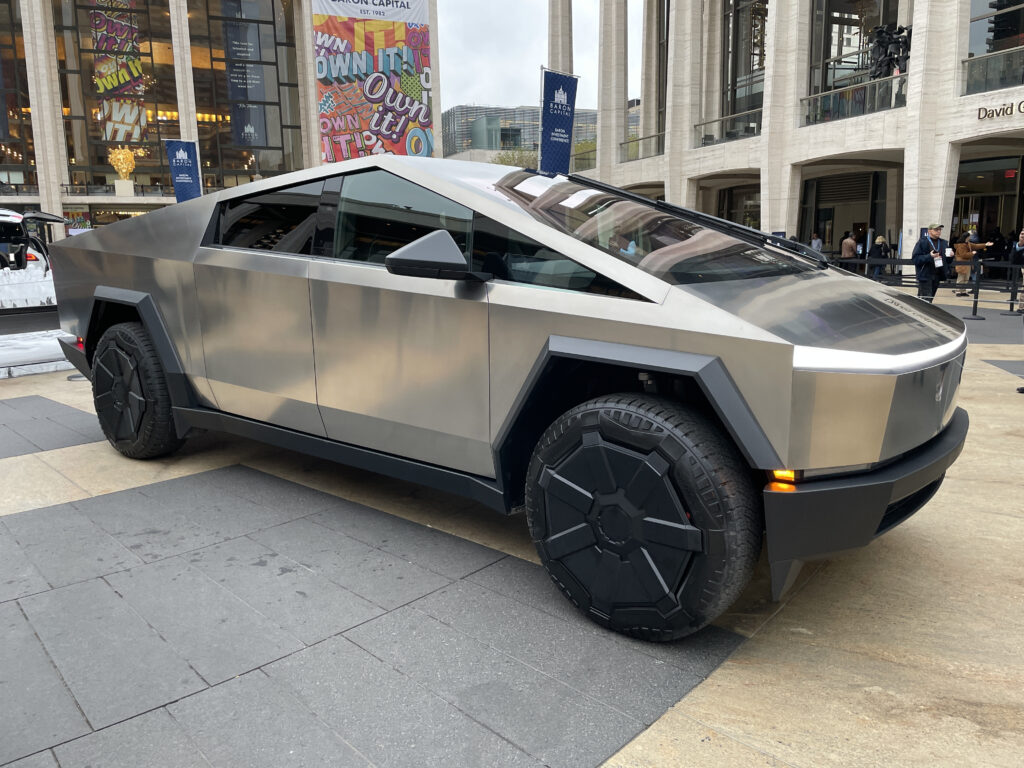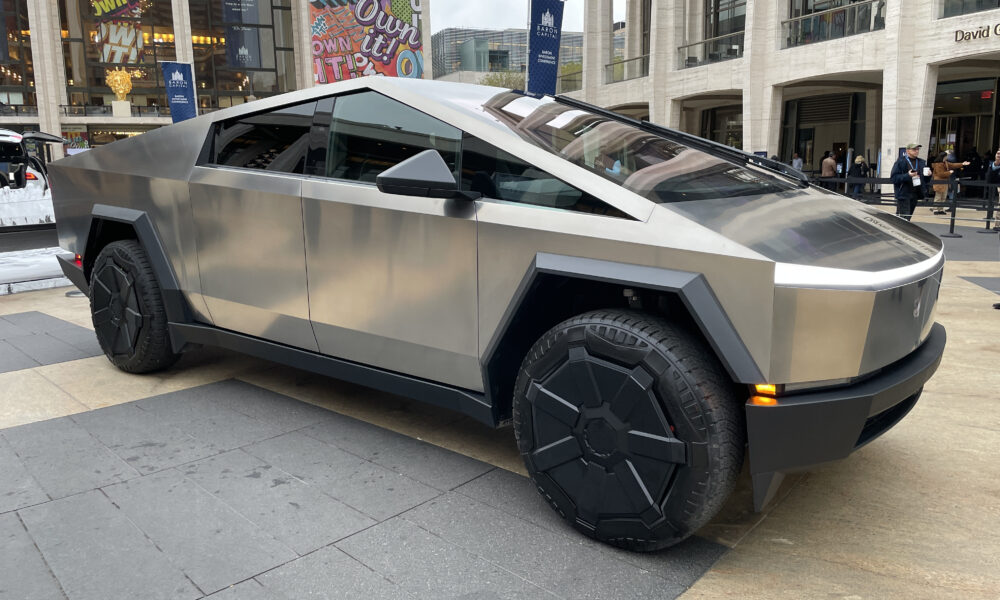Category: Tesla Cybertruck
Bauhaus Meets Blade Runner: Tesla’s New Cybertruck
 Arriving in time for the end of tailgating season, the Cybertruck, with its futuristic—if controversial—angular design, will certainly be a head-turner as deliveries begin. Originally unveiled in 2019 as a bullet-proof prototype that was not bullet-proof, the Cybertruck’s unique design aesthetic is a blend of Bauhaus and Blade Runner. The sports car-like pickup truck presents myriad manufacturing and component sourcing challenges, as stainless steel is difficult to form, bend, cut and weld. It is also difficult to maintain a uniform appearance. According to an internal email written by Tesla CEO Elon Musk in August of this year, “all part dimensions need to be to the third decimal place in millimeters and tolerances need to be specified in single digit microns.” As if to downplay this lofty objective, Musk went on to write, “If LEGO and soda cans, which are very low cost, can do this, so can we.”
Arriving in time for the end of tailgating season, the Cybertruck, with its futuristic—if controversial—angular design, will certainly be a head-turner as deliveries begin. Originally unveiled in 2019 as a bullet-proof prototype that was not bullet-proof, the Cybertruck’s unique design aesthetic is a blend of Bauhaus and Blade Runner. The sports car-like pickup truck presents myriad manufacturing and component sourcing challenges, as stainless steel is difficult to form, bend, cut and weld. It is also difficult to maintain a uniform appearance. According to an internal email written by Tesla CEO Elon Musk in August of this year, “all part dimensions need to be to the third decimal place in millimeters and tolerances need to be specified in single digit microns.” As if to downplay this lofty objective, Musk went on to write, “If LEGO and soda cans, which are very low cost, can do this, so can we.”
Like the original Ford Model T, the Cybertruck is available in just one color: in this case, unpainted stainless steel. Unlike any of the full-size pickup trucks available from Ford, GM, and Stellantis, which dominate the 2.5 million unit market in the U.S., the Cybertruck is, in the words of the announcer on Monty Python, something completely different.
First off, the Cybertruck looks like something that would be lowered from the Lunar Module to collect rocks on the moon, rather than a run-of-the-mill pickup truck that will haul and tow cargo for tradesmen. It remains unclear how resistant the car body will be to dings, scratches and outright dents, but we do know that ultra-hard stainless steel is difficult to repair, treat and restore to its original finish. This makes it impractical for hauling and towing construction equipment, as well as collecting moon rocks. And yet the Cybertruck is remarkably competitive with other EV pickup trucks on the market in terms of brute strength: it boasts a maximum tow capacity of 11,000 pounds, while its 2,500 pound maximum payload is almost 50 percent greater than the Rivian R1T, and a bit more than the Ford F-150 Lightning.
An important unresolved question is whether the Cybertruck will appeal to the sub-segment of the pickup truck market that is already purchasing an electric truck. If so, the numbers are not very encouraging. Of the projected 2.46 million pickup trucks that will be purchased in the U.S. this year, less than two percent, or something like 35,000 units will be either Ford F-150 Lightning or Rivian R1Ts.
Rivian has, in fact, seen its product mix shift heavily in favor of its full-size electric SUV, while Ford has announced plans to reduce its EV pickup truck volume for 2024, while also having vowed to double the number of Ford F-150 hybrid engine vehicles it intends to sell next year. All of this suggests that there may be less enthusiasm about EVs among both traditional and non-traditional buyers of pickup trucks.
Getting down the cost curve with a reasonable price for the Cybertruck will be key for Tesla to penetrate the market. Though the first wave of users is unlikely to be tradespeople, there is no reason that subsequent waves couldn’t be, given the truck’s towing and payload capacity, which is sure to improve over time. We are sure that Cybertruck version 5.0 will be quite different from previous versions.
Put differently, the more affordable Cybertruck becomes the bigger the market. At some point, though not today, the well-defined size of the pickup truck market will become relevant when the Cybertruck can breach the $50,000 or less entry level price point. Then the Cybertruck will be able to lay claim to its five-to-ten percent or more market share of the 2.5 million unit U.S. pickup truck market, which would equate to 125,000 to 250,000 annual units or more. Now it is only a question of time.
Competition Heating Up in Pickup Trucks
Rivian established a first mover advantage in the electric pickup truck market when it launched the R1T in 2021. Having won the coveted Motor Trend Truck of the Year award for 2022, Rivian, we believe, held the market share lead in EV pickup trucks as of the end of 2022.
Fresh on the heels of having won the Motor Trend Truck of the Year for 2023, Ford announced on January 5th that it has sold 15,617 F-150 Lightning trucks since the vehicle was unveiled to customers in May of last year. Ford has not so quietly been claiming that in each of the last two months it has sold more EV pickups than any other manufacturer.
By the end of Q1 2023, it is likely that Ford will pass Rivian to become the overall leader in electric pickup sales in the United States. This is not necessarily surprising, as Ford’s classic F-150 has been the best-selling truck in the United States for 46 consecutive years. Importantly, Ford offers the F-150 in multiple model variants that range in price from $40K to $90K. And Ford has many years of brand equity from which to draw. Moreover, while both Rivian and Ford are relatively inexperienced at building EVs, Ford has a demonstrated ability to produce vehicles in large volumes—something that Rivian has struggled with.
Another headwind facing Rivian is the inevitable launch of Tesla’s Cybertruck. To be clear, the Cybertruck is way behind schedule, relative to original estimates provided by Tesla, but it now appears that limited production will begin this summer. Rather than go head-to-head against Rivian and Ford in the market for conventional-looking EV pickup trucks, Tesla is taking a risk with a unique body style that is sure to electrify some, yet conceivably turn-off others. The angular, space-age body of the Cybertruck is equipped to handle any type of terrain, will supposedly feature a bullet-proof body, and will be manufactured with a unique mix of light-weight aluminum and ultra-hard 30x cold-rolled stainless steel.
From what we can gather, fly-over drone footage available over the Internet of Tesla’s Gigafactory in Texas revealed the recent delivery of at least part of a 9,000-ton Giga Press, which will be used to cast aluminum parts in the first production run. Elon Musk has said the Cybertruck, when available, will be the car he drives to work in Austin. The Cybertruck has the potential to put a freeze on the electric pickup truck market, as consumers will be curious to learn more about it before purchasing a rival vehicle. This is especially true for prospective Rivian buyers who desire an elite luxury pickup truck. While a case can be made that the R1T and Cybertruck may ultimately appeal to different buyers, it is likely that consumers who are interested in the R1T would also consider the Cybertruck for similar reasons. Could this be part of the reason why Rivian stopped disclosing its backlog?

